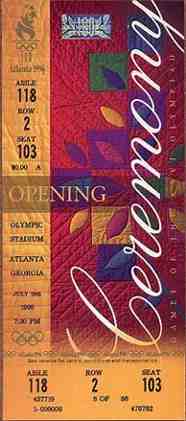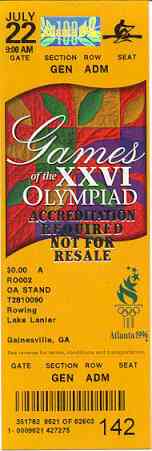Tickets
| Ticket Content and Design 1996
Ticket Sales was responsible for the production and distribution of tickets, but decisions on the printed content and security of tickets were made with the assistance of Protocol, Security, Transportation, and Venue Management. ACOG's Creative Services Department designed all aesthetic elements of the tickets. Because printing on the tickets had to be large enough to be legible to customers, bus and train attendants, and ticket takers, they were printed only in English, the common language of the majority of spectators. Specific security measures involving paper, ink, and the printing process were also incorporated into the design. Three holograms commemorating the Centennial Olympic Games fulfilled both artistic and security requirements. Each ticket was imprinted with the session's
venue name, geographic location of the venue, sport name, a pictogram of
the sport, the date and time the session would take place, a unique session
code, and seating information. One challenge was to create a common way
of describing gates or portals, aisles or sections, rows, and seats at
the various venues. Tickets for the arts events included additional descriptions
for balcony and orchestra sections. The final format allowed for four character
fields with alterable title fields. For venues with fewer than four categories
of seat specifications, the excess fields were suppressed during imprinting.
Most tickets read "Gate, Section, Row, Seat."
Other details imprinted on each ticket included the price in US dollars and the price level (A, B, C, or D), the session code, a bar code used for redistribution purposes, and the customer account number. Tickets complied with Rule 51 of the Olympic Charter prohibiting advertising. (The disclaimer on the reverse, which included all spectator rules, is shown in Figure 1.) Ticket Sales produced distinctive, commemorative
tickets for both Opening and Closing Ceremonies and souvenir tickets for
all other sessions. For box office sales, thermal ticket stock incorporated
design features similar to the souvenir stock. Ticket dimensions for the
Opening and Closing Ceremonies were 3.75 x 8.5 in (9.53 x 21.6 cm), and
souvenir ticket dimensions were 2.5 x 7.5 in (6.35 x 19.05 cm). All four ticket designs corresponded with the Look of the Games motif. Creative Services worked closely with the ticket printer, Weldon, Williams & Lick, to ensure that design ideas were feasible from a printing standpoint. For additional security, the agency was referred to generically as the ticket printer, rather than by its company name. (Source document: Official Report 1996, Vol. 1, page 464) |


